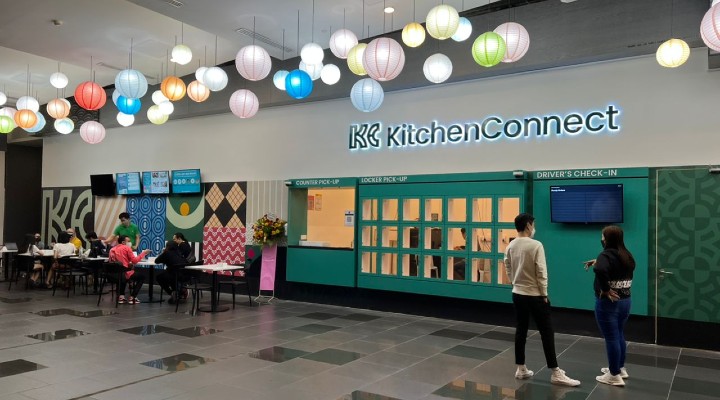During the pandemic, the adoption of virtual or ghost kitchens accelerated, as more people turned to food delivery services. Virtual kitchen Kitchenconnect has officially debuted in Malaysia. With over 110 kitchens and four locations, it provides a kitchen-as-a-service solution to help launch, grow and expand food businesses. The brand is part of the Cloudkitchens network, which was founded by Uber co-founder Travis Kalanick in 2020 and has locations across the US. According to Kitchenconnect ge
ect general manager Arin Aghazarian, the brand is essentially a tech-focused virtual kitchen provider with facilities that are optimised for delivery for any food and beverage business keen on being a licensee.
“We assist in providing a fully equipped kitchen. We also manage all the non-core functions such as maintenance and hygiene and provide a team of delivery and restaurant operations experts to assist with onboarding,” she told Inside Retail.
Kitchenconnect is currently in Jalan Ampang, Mont Kiara, Bangsar and Damansara Jaya.
The Malaysian marketplace
Aghazarian believes that every person with a dream of becoming a chef or an entrepreneur should have the opportunity to pursue it and that is why she takes pride in the Kitchenconnect business model.
“We offer a lower risk and lower investment model for entrepreneurs to start a business and hence why we don’t discriminate against any potential businesses – small or big. We are ready to help anyone from a new startup to a large QSR chain.”
She explained that the brand saw a huge increase in delivery volumes during the pandemic, with projected volumes by 2025 already occurring from 2020 onwards.
“When restrictions were eased, we observed some people “revenge dine-out” as a trend and we did see a slight drop in volumes but now that norm is back, people are returning to their newly established habits – mainly ordering in – instead of worrying about buying groceries, preparing a meal and cleaning up after themselves.”
Interestingly, all of its outlets have a small dine-in component to give consumers the option to enjoy their meals on the premises as well.
An end-to-end solution
With a focus on supporting start-ups, Kitchenconnect handles all aspects of the ordering process including menu management, operations metrics, data analysis, tracking and reporting via a singular platform.
Aghazarian stated that any business that uses the platform can save on capital and operating expenditures, whilst getting their delivery up and running within three to four weeks of onboarding.
“Each of our locations have 20 to 30 kitchens that are equipped with all the mechanical, electrical and plumbing (MEP) services and restaurants can licence the space and customise as per their needs, she said.
She explained that all the licensees need to do is bring their own specialised equipment and start cooking. Their internal team of delivery and operations experts can assist with getting their businesses on popular delivery platforms such as Grabfood, Foodpanda, Airasia food and Shopeefood.
“We take care of all shared services as well such as pest control, exhaust cleaning, grease trap cleaning, kitchen insurance so all our customers need to worry about is marketing their brands and cooking their delicious food,” she said.
Optimisation is key
Malaysia, like other countries in the region, is experiencing a labour shortage issue across a wide range of vertical markets due to increased regulatory oversights regarding workers’ rights, living wages and welfare conditions.
According to Aghazarian, the brand’s concept can be instrumental in optimising labour requirements for licensees.
“By eliminating front-of-house staff, waiters, cashiers, and keeping only two to three chefs, we are reducing the burden on recruiting. Once the order is ready, our team will pick up the order from the kitchen and hand it over to the end consumer or the rider, effectively eliminating customer service from the restaurants,” she said.
By also integrating the technology aspect, licensees can save time and work with their menu management through automated processes. With their proprietary technology, restaurants can consolidate every delivery tablet into one platform.
This helps them visualise their sales, understand which items are top sellers and which items should be removed from the menu, know their sales by hour and optimise labour accordingly.”
Gazing into the crystal ball
The food delivery business in Malaysia has always been a competitive marketplace, with companies like Grabfood, Foodpanda, Airasia food and even Shopeefood. Aghazarian feels that with the thriving gig economy and demand for food delivery, Malaysia still has the capacity to grow in this space.
“For Malaysia, we are looking to expand to two or three more facilities within Klang Valley by the end of 2022 and in 2023, and we are planning on expansion throughout the country. We do have partner Cloudkitchens players overseas that we collaborate with,” she said.
She feels the brand can streamline the entire last mile of the delivery process, as riders can pick up multiple orders from one place faster, which results in better payoffs for riders and better fulfilment of orders for restaurants within the facility.
Licensees will also have the ability to use data to understand more about customer preferences and learn to serve their target audience better through faster iterations of their product offerings.
Ultimately, in Aghazarian’s opinion, consumers will get more choices, and more importantly get their food faster, fresher and at a lower cost for delivery.

